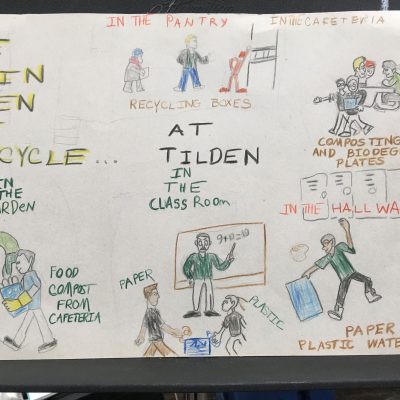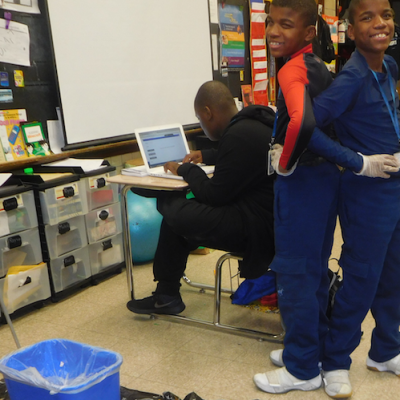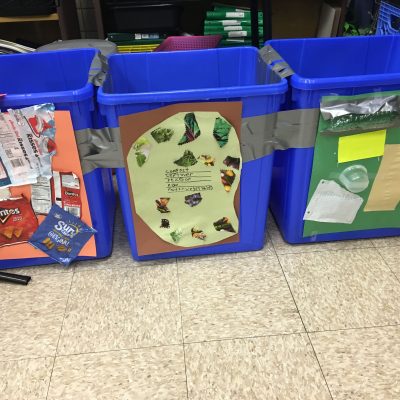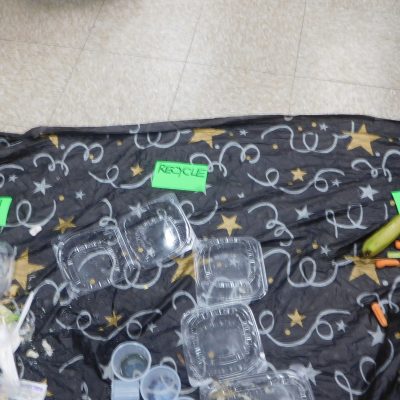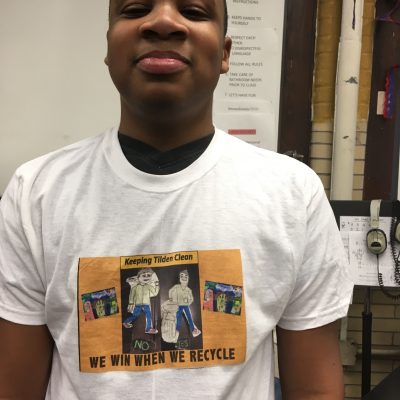21st Century Waste Management: Keeping Tilden Middle Community School Clean and Green!
What did they care about?
Tilden Middle School is a community school in southwest Philadelphia, so Cheryl Padgett recognized early on that they had built-in partnerships to expand on. She knew a yearlong project would be perfect for her students with autism, as it would provide the opportunity for these amazing and creative students to share their talents with the wider community.
A “neighborhood walk” gave the class a chance to look closely at both the inside and the outside of the school. They discovered multiple challenges with waste management in classrooms and corridors, from overflowing trash cans and mixed recycling to trash and compostable items in the same bins. They even wondered if some of the fresh fruit and vegetable waste from the lunchroom could be used for compost in the school garden.
Learning that the city of Philadelphia is launching a “Zero Waste” initiative, the class decided to focus their service-learning project on ways to help their school be part of the process. How could they help Tilden become “cleaner and greener?” How could they meet the goals of 21st Century waste management that includes recycling, composting and proper trash disposal?
What did the students learn?
Ms. Padgett’s students learned so much about the complex issues involved in waste management! They researched. They brainstormed. They prototyped ideas. They gained important background knowledge from their community partners at the Philadelphia More Beautiful Committee and the Philadelphia Water Department. From the School District of Philadelphia’s GreenFutures program they learned about the long term plan that includes “consumption and waste” as an important area of focus.
The class also learned that the school would generate too much organic matter to use in the school garden as compost. So they switched up the plan from composting to a “compost education program” helping others make changes where possible and preparing for the day that the city has plan for managing compostable waste matter.
Before they decided on the the service component to their project, the class wanted to know what other folks at Tilden Middle School knew about the issues. They created and distributed surveys to fellow students and conducted interviews with visitors and staff members. From the responses they learned that the majority of students did not know the difference between compost and trash, and most didn’t realize that recycling was an important way of reducing waste in landfills.
Their powers of observation helped identify the areas of greatest need. They noticed the art room lacked a recycling container and most classroom trash bins were just too small. They took sample trash bins from classes and emptied them onto plastic tablecloths to sort. This hand-on study revealed that, in fact, trash and recyclable materials were not properly separated. The sorting in the lunch room was managed better but the bins used were considered “ugly and plain.” Fellow students appreciated the prototyped decorative and attractive containers.
What did they do about the issue?
After all of this rich learning it was no surprise to have a multi-faceted service project emerge. It was important for the class to create awareness about the importance of keeping classrooms and corridors clean. They made posters, designed T-shirts, and created a public service announcement using fellow Tilden students as spokespeople in the video. Visiting classes with short, interactive presentations on the difference between trash, compost and recyclable materials proved to be a great way to spread the word.
One team member created an animation film about some of the aspects of waste management at Tilden Middle School–and it won 1st Place in the school district’s 2018 Technology Fair! With students involved in the WHYY Media Lab program they wrote and filmed a news segment to educate others about composting.
When Tilden hosted their International Day showcasing the cultural artifacts and food samples celebrating the diverse student body, the “Tilden Trash Duo” made its debut. This receptacle was designed by the students to encourage separating waste for landfill and recycling. It was exciting to see their success as all guests used the proper containers to dispose of their materials.
Beyond the tangible service outcomes, we know that students were proud to part of making such a visible difference in their school. They were able to see transformation from a identifying a concern to creating solutions that will be appreciated for years to come.
Not only did this project have an impact on my students, it also taught me how I can integrate service learning with curriculum and what a powerful effect it can have in the classroom.
Year 1 Need in Deed Teacher
